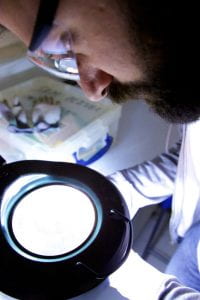Job sharing – Dorian Jones
“Job-sharing: the pros outweigh the cons”
Dr Dorian Jones is an Associate Professor in Aerospace Engineering, and Joint Head of the Aerodynamics and Fluid Dynamics Research Group. Here, he gives his perspective on job sharing this academic role with Dr Ann Gaitonde.
How did you start out in your career?
I’m from Wales originally, and I finished my PhD in 1995, after which both Ann and I were Research Associates in Fluid Mechanics. Initially we were both in the same field but as time has gone on that has been less important. I spent seven years as an Research Associate, I started full-time but in 1998 I became part-time due to having two children. I now have four! My wife was also part-time so we organised it so that we shared the childcare 50/50 between us. We were both at home with them and so didn’t ever have childcare logistics and dropping them off, which was one less thing to organise – my wife did two days at work and I did three days.
When did you decide to go for a job share?
By the time a lecturer position came up in Aerospace in 2002, Ann and I both had had children, and were both in part-time Research Associate roles. The issue with Research Associate roles is that they are temporary due to funding, so the lack of job security was impacting on us. We were very senior Research Associates and were writing our own proposals, so it gets frustrating at this level that you cannot be the Principal Investigator at this stage if you’re a Research Associate. We realised that we could lead on research projects if we went for the next level.
We knew each other already, and knew each other’s working patterns– so it seemed the logical thing to do to both apply for a job share – we realised we could do this together. Initially the response was confused, but then they said yes. But in terms of recruitment we had to be treated as separate applicants and then be ranked first and second, applying for the role as full-time, and then both requesting for part-time. These processes have probably changed it was 2002/3 – I hope!
We’re quite similar in terms of our academic aspirations. For us, it was never about status. I didn’t want to be ‘Professor Jones’, I just wanted to do an interesting job and be able to be at home some of the time. That matching of aspiration between Ann and I is probably why our job share has lasted so long.
Once I started in a Pathway 1 lecturer post, it turned out that I like the teaching side of it. I used to do a lot of sports coaching in rugby clubs, so I’m interested in the coaching and teaching side of things. In coaching, you don’t introduce processes, you manage the people and get the best out of them. It’s why I get annoyed with processes!
Ann and I have stayed in the same working patterns with Ann doing 2 days a week and me doing three days a week ever since, but I must admit it would be better to do three days a week each.
How do you make it work?
It’s a simple case of sitting down and working out who does what work, taking your share equally. We can have conversations on changing it around, working out who wants to do what. Tasks come in chunks, so we divide it up. Ann is more conscientious than I am! She knows the processes inside out. But most importantly, neither of us has a tendency to dump work on the other.
We try to avoid any interdependencies. We don’t expect to do the same tasks – for example, Ann did the Erasmus ‘going out’ students role and I only saw the students when they were coming back, so she was doing more in terms of workload on Erasmus, but I then had more project students to balance this out. I had the first-year tutees, who you need to see a lot, and Ann had second-year tutees, so only had to see them every other week. Essentially, we took the overall full-time role and split it. We’re not in a production line and can’t interchange that easily, so we have to divide the jobs up, but we also do cover for each other when there’s an emergency. This also means that we don’t have to hand over information to each other and spend a lot of time meeting each other to catch each other up. We even teach separate units but they’re still core units that the programmes need. It’s easy to organise teaching so that it’s 0.5 Full Time Equivalent (FTE).
How did promotion work?
For Senior Lecturer, it was relatively straight forward, but we had to apply together. We were given a promotion as a job share rather than two separate individuals going for a promotion at the same time. It was hard to get the university to see it the way we did. We always said that we wouldn’t accept a promotion individually, only as a job share.
When applying to be promoted to Reader, we looked at our profile and realised that it was time to go for it in terms of what we were doing already and the successes we were having. The problem here was that we had to submit as two different people rather than as a job share like we had done for senior lectureship. Each of us had to get recommendation letters from three different academics from outside the University of Bristol who know about your work but not have collaborated with you. This meant collectively we had to find six different people, as we weren’t allowed to have the same three, which was really tough, as our research is quite niche and we tend to collaborate with the people who know our work well.
Also, we had one issue where these rules were interpreted by one person whom we asked to be an academic referee, as being about their institute working with the University of Bristol rather than us as individuals working together, so we had to find someone else. This seemed a bit of an unfair hurdle. It was awkward, as you want to get the most internationally recognised people you can as a referee, but on the most part you’ll have collaborated with them. Also, we didn’t know that you needed an EPSRC track record as we mainly go for European money and industry funding. But we got promoted in the end!
What next?
More research! Brexit did have an impact, but now it seems clearer what’s happening those partners an However, I must say that job sharing is still not that well understood by colleagues in the faculty. There have been quite a few situations when we’re given double the workload, as it’s not understood we’re a job share, so we have to remind our colleagues again and again. It happened as recently as last year! In the majority of cases people have simply forgotten and just apologise and rectify it, but you do have to be aware that they might forget.d funders are starting up again, multinational companies are the main funding source for us. We’re trying to build up EPSRC contracts too. Professorial promotion looks complex, as it’s focused on the individual, so we might not be able to do this.
My children are older now, there’s only one left at home, but neither my wife nor I are particularly interested in going full time. I’m a builder and enjoy spending my time renovating houses, we’ve renovated multiple houses. I started learning the skills required for this once my children were in primary school – I started knocking down walls! I’m doing all the carpentry, wiring and plumbing at the moment. This helps me not work full-time, as it means I have a lot to do at home, so although it’s not a nine-to-five job, my renovation work keeps me busy on the days I don’t work and means I don’t end up working a full-time job on a part-time salary.
What advice would you give people considering a job share in an academic post?
The pros outweigh the cons! The cons can be annoying, such as finding your research can be harder to do, but the pros, such as having time to yourself, outweigh it. Teaching and admin around students are fairly simple to split out, although there is some admin just as a member of staff that you both have to do. Also having something to keep you busy at home helps to manage a three-day-a-week job. But it is certainly something that we both benefit from and have made work well for us.




